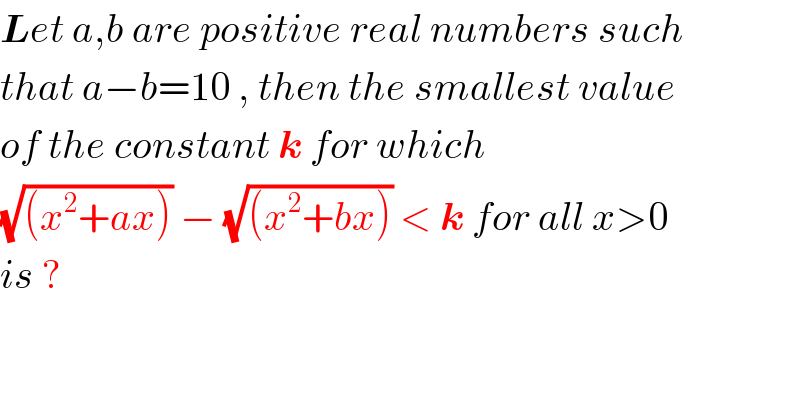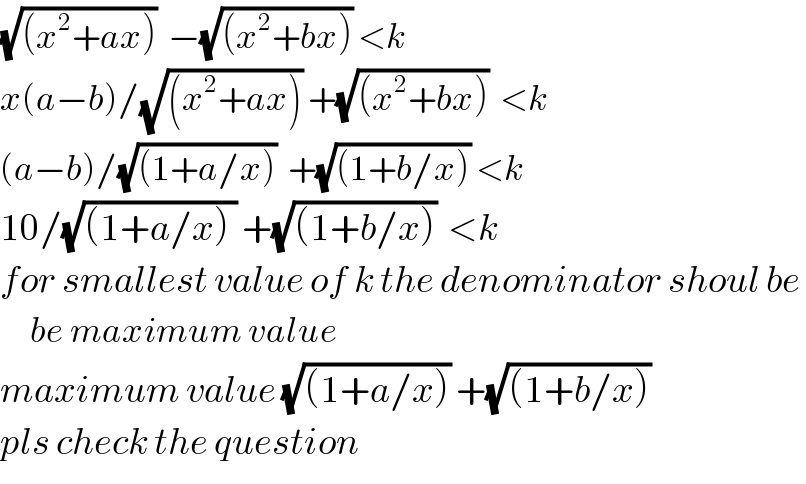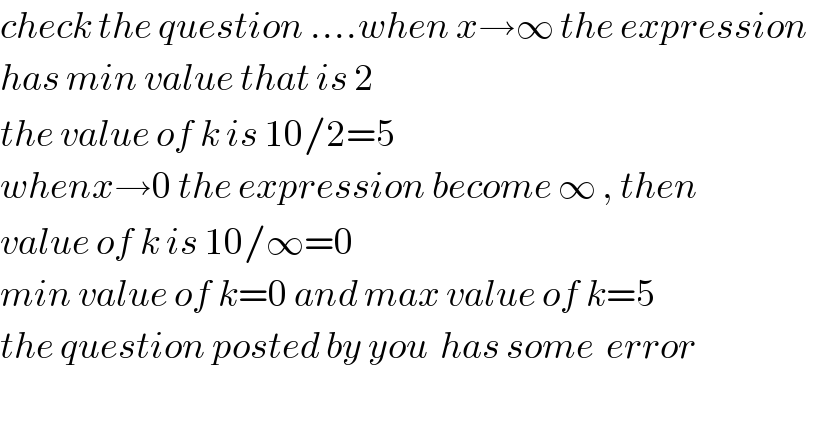
Question and Answers Forum
Previous in Relation and Functions Next in Relation and Functions
Question Number 33940 by rahul 19 last updated on 28/Apr/18

Answered by MJS last updated on 28/Apr/18
![a=r+5 b=r−5 (√(x^2 +rx+5x))−(√(x^2 +rx−5x))<k we have to show that lim_(x→∞) (√(x^2 +rx+5x))−(√(x^2 +rx−5x))=5 sorry I have no time right now... (√(x^2 +rx+5x))−(√(x^2 +rx−5x))=k (I.) [x=y ⇒ (1/x)=(1/y)] (1/((√(x^2 +rx+5x))−(√(x^2 +rx−5x))))=(1/k) [(1/(u−v))=((u+v)/((u−v)(u+v)))=((u+v)/(u^2 −v^2 ))] (((√(x^2 +rx+5x))+(√(x^2 +rx−5x)))/(x^2 +rx+5x−(x^2 +rx−5x)))=(1/k) (((√(x^2 +rx+5x))+(√(x^2 +rx−5x)))/(10x))=(1/k) (√(x^2 +rx+5x))+(√(x^2 +rx−5x))=((10x)/k) (II.) 2(√(x^2 +rx+5x))=k+((10x)/k) (I.+II.) 4(x^2 +rx+5x)=k^2 +20x+((100x^2 )/k^2 ) (4−((100)/k^2 ))x^2 +4rx−k^2 =0 x^2 +((k^2 r)/(k^2 −25))x−(k^4 /(4(k^2 −25)))=0 x=−((k^2 r)/(2(k^2 −25)))±(k^2 /(2(k^2 −25)))(√(k^2 +r^2 −25))= =((r±(√(k^2 +r^2 −25)))/(2(k^2 −25)))k^2 (1/x)=((2(k^2 −25))/(r±(√(k^2 +r^2 −25))))×(1/k^2 ) x→∞ ⇒ k^2 −25=0 ⇒ k=±5 (√(x^2 +rx+5x))−(√(x^2 +rx−5x))>0 ⇒ k=5](Q33948.png)
Commented byrahul 19 last updated on 28/Apr/18

Commented byMJS last updated on 28/Apr/18

Commented byrahul 19 last updated on 28/Apr/18

Answered by tanmay.chaudhury50@gmail.com last updated on 28/Apr/18

Commented byrahul 19 last updated on 28/Apr/18

Answered by tanmay.chaudhury50@gmail.com last updated on 28/Apr/18

Commented byrahul 19 last updated on 29/Apr/18

Commented bytanmay.chaudhury50@gmail.com last updated on 29/Apr/18

